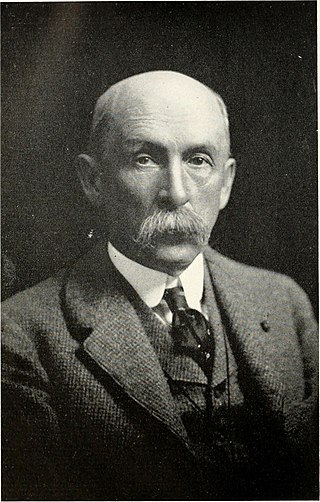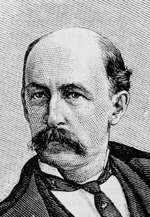
Wade Hampton III was the scion of one of the richest families in the ante-bellum South, owning thousands of acres of cotton land in South Carolina and Mississippi, as well as thousands of slaves. He became a senior general in the Confederate Army of Northern Virginia during the American Civil War. He also had a career as a leading Democratic politician in state and national affairs.

Daniel Henry Chamberlain was an American planter, lawyer, author and the 76th Governor of South Carolina from 1874 until 1876 or 1877. The federal government withdrew troops from the state and ended Reconstruction that year. Chamberlain was the last Republican governor of South Carolina until James B. Edwards was elected in 1974.

John Lawrence Manning was the 65th Governor of South Carolina, from 1854 to 1856, and, though elected to the U.S. Senate in 1865, was refused a seat there because of his former Confederate allegiance.

The 1876 South Carolina gubernatorial election was held on November 7, 1876, to select the governor of the state of South Carolina. The election campaign was a referendum on the Radical Republican-led state government and their Reconstruction policies. Opponents disputed the challenger Wade Hampton III's victory, gained by a margin of little more than 1100 votes statewide. But he took office in April 1877, after President Hayes withdrew federal troops as a result of a national Democratic compromise, and the incumbent Daniel Henry Chamberlain left the state.

The 1878 South Carolina gubernatorial election was held on November 5, 1878 to select the governor of South Carolina. Wade Hampton III was renominated by the Democrats and ran against no organized opposition in the general election to win reelection for a second two-year term.

The 1868 South Carolina gubernatorial election was held for two days from June 2 to June 3, 1868, to elect the governor of South Carolina; elections for statewide offices were held following the ratification of the South Carolina Constitution of 1868 on April 16. Republican Robert Kingston Scott won the election largely with the support of the newly enfranchised black vote and became the state's 74th governor.

The 1870 South Carolina gubernatorial election was held on October 19, 1870, to select the governor of the state of South Carolina. Governor Robert Kingston Scott easily won reelection based entirely on the strength of the black vote in the state. The election was significant because white conservatives of the state claimed it showed that political harmony between the white and black races was impossible and only through a straightout Democratic attempt would they be able to regain control of state government.

The 1872 South Carolina gubernatorial election was held on October 16, 1872, to select the governor of the state of South Carolina. Franklin J. Moses, Jr. won the election as a Radical Republican against the more moderate faction of the Republican Party and became the 75th governor of South Carolina.

Martin Witherspoon Gary was a Confederate attorney, soldier, and politician from South Carolina. He attained the rank of brigadier general in the Confederate States Army during the American Civil War. He played a major leadership role in the 1876 Democratic political campaign to elect Wade Hampton III as governor, planning a detailed campaign to disrupt the Republican Party and black voters by violence and intimidation.

The 1974 South Carolina gubernatorial election was held on November 5, 1974 to select the governor of the state of South Carolina. Initially considered a longshot candidate, Republican James B. Edwards defeated Democrat W. J. Bryan Dorn with a narrow majority of the vote.

The 1880 South Carolina gubernatorial election was held on November 2, 1880 to s elect the governor of South Carolina. Johnson Hagood was nominated by the Democrats and ran against L. W. R. Blair, a Greenback-Labor candidate. Hagood easily won the general election and became the 80th governor of South Carolina.

The 1882 South Carolina gubernatorial election was held on November 7, 1882 to select the governor of the state of South Carolina. Hugh Smith Thompson was nominated by the Democrats and ran against J. Hendrix McLane, a Greenback-Labor candidate. Thompson easily won the general election and became the 81st governor of South Carolina.

The 1886 South Carolina gubernatorial election was held on November 2, 1886, to select the governor of the state of South Carolina. John Peter Richardson III was nominated by the Democrats and became the 83rd governor of South Carolina.

The 1888 South Carolina gubernatorial election was held on November 6, 1888, to select the governor of the state of South Carolina. John Peter Richardson III was renominated by the Democrats and was reelected for a second two-year term.

The 1890 South Carolina gubernatorial election was held on Tuesday November 4, to elect the governor of South Carolina. Ben Tillman was nominated by the Democrats and easily won the general election against A.C. Haskell to become the 84th governor of South Carolina.

The 1894 South Carolina gubernatorial election was held on November 6, 1894 to select the governor of the state of South Carolina. John Gary Evans was nominated by the Democrats and became the 85th governor of South Carolina.

The 1896 South Carolina gubernatorial election was held on November 3, 1896 to select the governor of the state of South Carolina. William Haselden Ellerbe won the Democratic primary and easily won the general election to become the 86th governor of South Carolina.

The 1910 South Carolina gubernatorial election was held on November 8, 1910, to select the governor of the state of South Carolina. Coleman Livingston Blease won the Democratic primary and ran unopposed in the general election to become the 90th governor of South Carolina.

From December 1876 to April 1877, the Republican and Democratic parties in South Carolina each claimed to be the legitimate government. Both parties declared that the other had lost the election and that they controlled the governorship, the state legislature, and most state offices. Each government debated and passed laws, raised militias, collected taxes, and conducted other business as if the other did not exist. After four months of contested government, Daniel Henry Chamberlain, who claimed the governorship as a Republican, conceded to Democrat Wade Hampton III on April 11, 1877. This came after President Rutherford Hayes withdrew federal troops from the South.




















